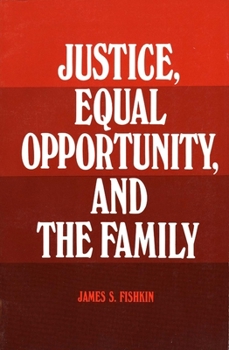Justice, Equal Opportunity and the Family
Select Format
Select Condition 
Book Overview
Three common assumptions of both liberal theory and political debate are the autonomy of the family, the principle of merit, and equality of life chances. Fishkin argues that even under the best conditions, commitment to any two of these principles precludes the third.
"A brief survey and brilliant critique of contemporary liberal political theory.... A must for all political theory or public policy collections." -Choice
"The strong points of Fishkin's book are many. He raises provocative issues, locates them within a broader theoretical framework, and demonstrates an urgent need for liberals to set certain priorities. His main message--that liberalism has radical implications for ordinary life--needs to be heard by many." --Virginia L. Warren, Michigan Law Review
"A highly original and powerfully argued book.... Fishkin is undoubtedly right, and his warning needs to be taken seriously.... This is not a book that catechizes us about what we should believe concerning the practicalities of distributive justice. It is a book that advises us about how we need to think about beliefs that are already popular dogmas, in the interest of making sense." -James Gaffney, America
James S. Fishkin is associate professor of political science at Yale University. He is also the author of The Limits of Obligation and Beyond Subjective Morality.
"A brief survey and brilliant critique of contemporary liberal political theory.... A must for all political theory or public policy collections." -Choice
"The strong points of Fishkin's book are many. He raises provocative issues, locates them within a broader theoretical framework, and demonstrates an urgent need for liberals to set certain priorities. His main message--that liberalism has radical implications for ordinary life--needs to be heard by many." --Virginia L. Warren, Michigan Law Review
"A highly original and powerfully argued book.... Fishkin is undoubtedly right, and his warning needs to be taken seriously.... This is not a book that catechizes us about what we should believe concerning the practicalities of distributive justice. It is a book that advises us about how we need to think about beliefs that are already popular dogmas, in the interest of making sense." -James Gaffney, America
James S. Fishkin is associate professor of political science at Yale University. He is also the author of The Limits of Obligation and Beyond Subjective Morality.
Format:Paperback
Language:English
ISBN:0300032498
ISBN13:9780300032499
Release Date:September 1984
Publisher:Yale University Press
Length:200 Pages
Weight:0.60 lbs.
Dimensions:0.7" x 5.5" x 8.2"
Customer Reviews
1 rating
Fishkin's Trilemma
Published by Thriftbooks.com User , 20 years ago
James S. Fishkin provides a very lucid account of a three-horned problem in American liberalism: the practical incompatability of some of the most cherished American beliefs. Despite almost universal acceptance, selection on the basis of merit, equal opportunity (not equal results), and the autonomy of the family (to dispose of its resources) are at odds. How this 'trilemma' is resolved hits at the heart of contemporary American politics. Fishkin's resolution of this fundamental tension is facinating and problematic.






